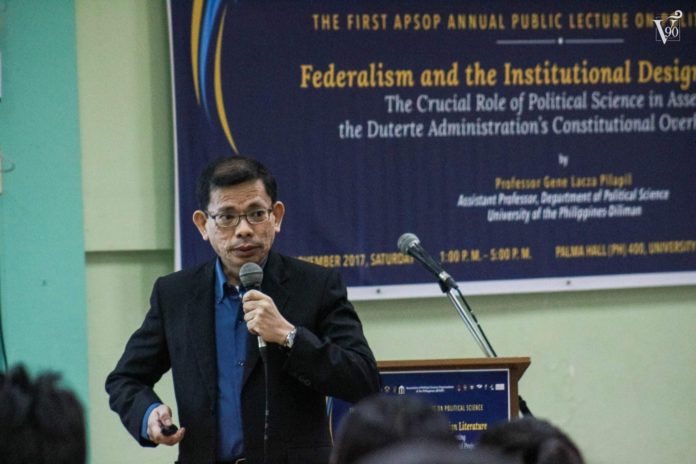POLITICAL science professors slammed last Nov. 11 proposals to shift from a unitary government to federalism, saying this was not a sure-fire way to spur the country’s social and economic development.
Gene Pilapil, a professor at the University of the Philippines in Diliman, said federal states were not necessarily superior to unitary states like the Philippines.
“There is no consensus on the superiority of the federal to the unitary system of government or parliamentary or semi-presidential to the presidential form of government,” he said in a conference in UP Diliman.
Under a federal system, sovereign powers will be shared between a central government and local units or regions.
Since 2005, four federal charters have been proposed. The first was in 2005, by UP Professor Emeritus Jose Abueva, followed by former Sen. Aquilino Pimentel Jr. in 2008. A version in the House of Representatives was submitted by ABS party-list Rep. Eugene de Vera and Pampanga Rep. Aurelio Gonzales in 2016, while the Federalism Institute of President Rodrigo Duterte’s Partido Demokratiko Pilipino-Lakas ng Bayan (PDP-Laban) party submitted its version last September.
The version of PDP-Laban Federalism Institute adopted a semi-presidential system wherein the president, who is elected into office, will be the head of state while the prime minister, who will be nominated by the president from the roster of Federal Assembly members after elections, will be the head of government.
In the draft constitution proposed by the institute, the Office of the Vice President is scrapped while the president will serve a 5-year term, with re-election.
The draft also proposed the creation of a parliament consisting of two houses: the Federal Assembly as the national legislative authority, and the Senate as the legislative body representing regional governments.
The draft was prepared by a 15-member study group including the institute’s executive director, Jonathan Malaya, and Edmund Tayao who teaches political science in the Faculty of Arts and Letters
“If we want to speed up progress and economic development and lay the basis for a just and lasting peace in Mindanao, we must go federal,” Pimentel, who started the PDP-Laban Federalism Institute, said in a 2016 speech.
Pilapil dismissed these promises of progress, citing the higher score in the Human Development Index (HDI) of the Philippines (0.682) compared with federal countries like India, Iraq, Pakistan and South Africa. HDI measures a country’s development using indicators for life expectancy, gross national income and education.
“You might be quite surprised, especially if you’re familiar with how proponents of federalism in this country sell federal states as superior to unitary states,” Pilapil said.
‘No guarantee of decentralization’
Pilapil also said federalism would not guarantee decentralization or empowerment of local governments, contrary to claims of federalism supporters.
“A unitary system can be more decentralized than some centralized federal systems. For example, in our backyard, Indonesia is actually more decentralized than the Federal Malaysia,” he said.
Pimentel said in 2016 that the problem of the country was its “highly centralized form of government” which limited state service and job opportunities to Manila, and suggested the adoption of a federal system as a solution.
Pilapil, however, said a unitary government could also be highly decentralized and changing the form of government alone would not solve the country’s problems.
Power, he said, can be distributed to local governments without shifting to a federal system by revising the 26-year-old Local Government Code of 1991, which was authored by Pimentel.
“People say that federalism is the next logical step to decentralization but some would argue that the next logical step to decentralization is better decentralization,” he said.
Federalism may be approved in ‘rubber-stamp Congress’
Pilapil said the chances of federalism being approved in a plebiscite was high, considering the President’s “rubber-stamp congress.”
“If it goes out of the Senate, my hunch is that it’s going to be approved in a plebiscite because of the strong resources of the President,” he said.
For Sheila Orozco, professor at the Pamantasan ng Lungsod ng Marikina, there must be a careful understanding of federalism among Filipinos before a plebiscite.
“There has to be a concrete information dissemination to the people of what federalism stands for and what it does,” she said.
Changing the charter to shift to a federal system can be done through a constituent assembly, wherein sitting members of the Congress revise the charter, or through a constitutional convention, where a body separate from Congress will be elected or appointed to amend the Constitution. A third way is through people’s initiative or a signature drive.
The conference titled “Federalism and the Institutional Design Literature: The Crucial Role of Political Science in Assessing the Duterte Administration’s Constitutional Overhaul Project,” was held in UP Diliman.
To investigate and expose unspoken issues and anomalies, send confidential news tips to the Special Reports team of the Varsitarian at specialreports.varsitarian@gmail.com or at THE VARSITARIAN office, Rm. 105, Tan Yan Kee Student Center, University of Santo Tomas, España, Manila.



















